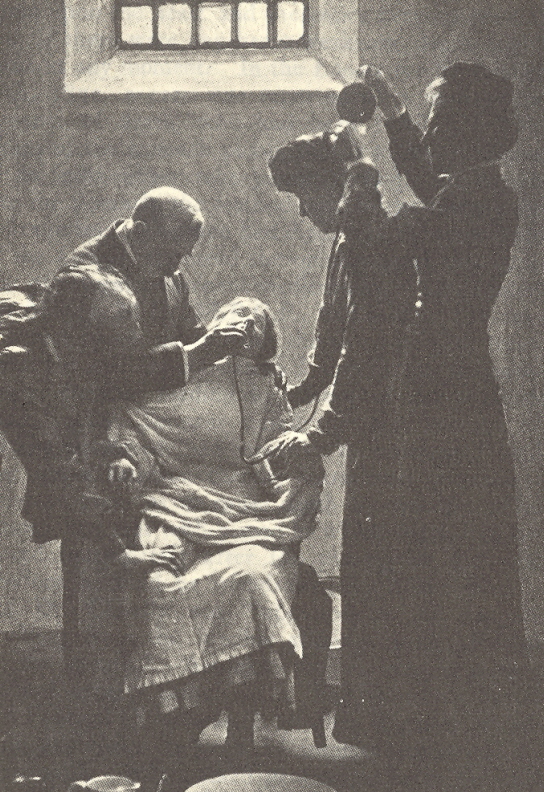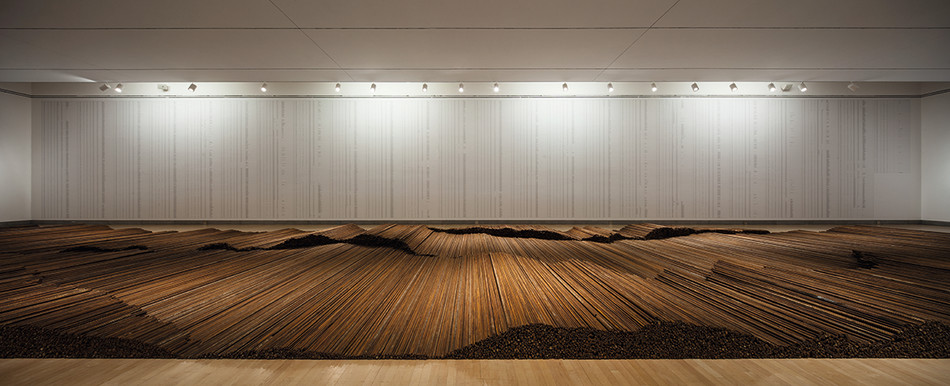The very last event of the Dromineer Literature Festival was an hour or so of Irish love poems performed and partly written by two Irish language poets, Ailbhe Ní Ghearbhuigh and Caitríona Ní Chléirchín, introduced by Dave McAvinchey with harpist Laura Hogan. This was in the keep of the castle, one floor up and open to the cold so we were all advised to dress warmly.
The poems, ancient and modern, were all written, and read, in the Irish language to an audience of Irish speakers, some being also read in English translation, but all glossed and introduced in English. I don't think the English was a piece of courtesy to Clarissa and I, possibly the only non-Irish speakers in the place. Some of poems were even given out on sheets with some English translation - not fully poetic translation - but close enough to follow.
At first I followed the sheets as best I could but slowly, as the programme moved on, I spent more time simply listening to the sound, looking to discern rhythm, dynamic, pace, alliteration, rhyme: in effect the music of the verse. The more I listened the more it communicated. The evening, having been introduced by a harp piece and the Irish poems having occasional harp accompaniment, ended with the harp, first with a beautiful and delicately played solo piece, and at the end with a song, a love lament, sung in English by the harpist, Laura.
I was a little tearful at the end of it all and wondered what exactly it was that moved me. The answer to that is as complex as the occasion itself, and indeed as the situation that produced the occasion and all other such occasions.
It is rather too much to think about in a form as small as this but some thinking is useful, starting, in reverse order, with the situation and the occasion, then moving back to my own self at the end.
The obvious starting place is the relationship between history and language. Like all small languages - meaning spoken by relatively few people, and I include Hungarian among such languages - Irish is and has been vulnerable for a long time. That vulnerability is a product of political power. Just as Hungarian might have disappeared as a written language in the eighteenth century so Irish might have disappeared because colonial power in both cases has always demanded control of language. Control the language and you control thought. Besides, it makes everything so much simpler in administrative terms and always has done. A lingua franca is necessary for cohesion. But of course it oppresses. Irish is a survivor language because people have given their passion and energy to help it survive, and it could only survive in face of the controlling power language, in Ireland's case, English.
So when Billy Ramsden's almost first words to us were:
I hate English, it made sense in that context while constituting a kind of challenge to us, visitors from the hated enemy. The irony is that Billy writes his poems in the hated language, a language that, as I remember, Michael Hartnett once said was "fit only to sell pigs in". Chaucer sold pigs, Shakespeare sold pigs, Donne, Herbert, Marvell, Milton, Pope, Swift, Coleridge, Wordsworth, Byron, Shelley, Keats
etc were all, by that token, merely sellers of pigs.
However, it is hard, if not impossible, to write poems in a language that one does not love and distrust, and indeed love must come first, distrust second.
How to do that when the language is the instrument of your historical oppression? One ought perhaps to ask the various Latin poets of the Roman Empire the same question. Billy's - and Hartnett's - statements are evidence of conflicted love in that sense. The political is at war with the poetic and, because the political is intensely felt, the gesture of hatred must be stated to precede the engagement with the language, just so that the listener, if from the territory of England, should know where he is regarded as potentially standing.
It was fascinating and moving to hear that strange conflicted-love articulate the desire to tear itself away from it. Both languages were moving together but it was the Irish that was being rightly celebrated and uttered. English was a functional prop most of the time.
It was I think, an important part of the emotional power of the evening that the poems read were love poems, poems of the sufferings and pleasures of love, which are much the same the world over, for however we attribute the establishing of romantic love as a tradition to the Troubador poets of the Crusades, it is impossible to feel that no romantic love existed before, that no one felt the pains, regrets, delights, ecstasies and losses of desire and attachment before the identifying of a form that embraced its realm of feeling in terms of rules, manners, language, and rites of passage.
Love poems are not the same as rebel songs. They are not anthems of the tribe: they invite individual identification with individual, if archetypal, experience. You do not have to be of the tribe to love, and indeed many tragic love stories are those of love across conflicting tribes. And because the poems we heard were love songs they included us all. So we, Clarissa and I, from our own very different and complex historical perspectives, felt enabled to share the poignancy of both the music and poetry. The modality of the music was not strange, after all. We have heard and continue to hear traditional Celtic song. Most nights on BBC Radio Three will include a few tracks based on such modality and they sing to us too, in our own displaced bones.
Fierce patriotic feeling has always been a problem for me. I feel its exclusion wherever I am, whether in Hungary, England, Ireland or anywhere else. I am nervous and edgy in its presence. It smells too much of self-mythologising and self-pity. It offers a cosy version of hatred. But it stands for something else too, for the familial, for the capacity of the family to welcome strangers. It sings the hearth and the community of families.
Nevertheless, patriotism and tribal loyalty carry the sense that our enemy's enemies become, perforce, our friends. We go to see Norwich City play their home games and are in some way part of a family in doing so. We note that the most hostile reception is reserved for our nearest rivals Ipswich Town. We are aware that the hostility is partly play, partly the positive channelling of conflicting emotions. There is no political tension between Norwich and Ipswich but the Norwich crowd is pleased to hear of an Ipswich loss to any other team at all. It is tribalism on a psychological level. In Ireland though, because of the unequal historical power relationship with England, there is both political and psychological cause for tension and the cause lives on through the creation and perpetuation of identity. 'We are who we are by definition against the enemy: that is the comforting fire of our cohesion'.
Those of us who, through long historical circumstances, are never quite to be included in the tribe - and there are growing numbers of us, we train-travellers of the unrooted soul - find the insistence on clear identity and clear antagonism problematic.
Every language articulates the diversity and intensity of a specific human social experience. The death of a language is the death of a part of the human race, an element of its soul. To hear Irish as something loved, articulated, moved into music, fully echoing with human fate, is bound to be moving even for an outsider - even for an outsider from the hated place - because it echoes a deep longing. But the singing of the last song, in English, also meant something and not just to us outsiders: it moved the Irish audience to the degree that some of them sang along with it.
What are they to do with this feeling?
Straight after, one local man - a very nice man - reminded me of Billy's words, repeating them exactly. Why remind me, I thought. Why right now? I had been moved by the experience of Irish. We had actively chosen to come to hear it. No one made us come. We weren't even fully English (Clarissa is half Scottish and was born and brought up in the Far East). Was this a statement, a challenge, or a kind of question? If it was to be regarded as a form of question ('So what do you think, eh?) what answer could I possibly give that might satisfy him or me?
So what did move me about the evening? It was, I think the glimpse of the psychological point at which two languages might exist in one place. How, after all, to sing a song that moves you in a language you hate? The very act is a reminder of pain. Which leaves the idea of hate. The hate was in one pocket, the song in the other. You could take out either. You could flash me the first before producing the second, but just to be sure you could flash it again after.








